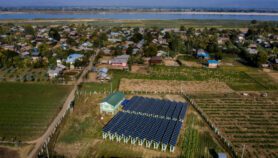By: A.A. Khan
Send to a friend
The details you provide on this page will not be used to send unsolicited email, and will not be sold to a 3rd party. See privacy policy.
[ISLAMABAD] Waste tea leaves could be a cheap source of biofuel that does not compromise food security, according to Pakistani scientists.
Researchers from the Nanoscience and Catalysis Division at Quaid-i-Azam University used a nanocatalyst, metal nanoparticles that accelerate reactions, to produce biodiesel from used tea leaves.
"The world today is consuming several million tonnes of tea yearly. This method could be utilised to produce alternative energy," Tajamul Hussain, co-author of the study, told SciDev.Net.
The scientists converted used leaves from the tea plant Camellia sinensis. Firstly, in a process called gasification, the dried spent tea was mixed with a Cobalt nanocatalyst and heated in a chamber to 300 degrees Celsius. Then, the liquid extract underwent a second process to produce 40 per cent ethyl ester — the biodiesel.
The gasification also produced 28 per cent hydrocarbon gas — made up of ethane, methanol and methane — and 12 per cent charcoal. The gas is combustible so it can be used directly as a fuel, while the charcoal can be used as a fertiliser or to remove heavy metals from contaminated water, the researchers say.
In another process, Hussain and colleagues used the fungus Aspergillus niger to ferment the tea — a cheaper but slower way of producing biodiesel. A. niger was grown on waste tea leaves and after a few days, produced 57 per cent biodiesel in the form of bioethanol.
But Kausar Malik, head of the Biotechnology Department at Forman Christian College in Lahore, said the study’s findings are not new and that scientists have long known that many kinds of organic matter can be made into biofuels.
Moreover, Malik called into question the efficiency of the tea conversion process. The energy costs of producing the biofuel outweigh the energy that the biodiesel itself could provide, he said.
"If we do a mass balance of input and output, we find is it not an economical option to be employed at industrial level," Malik told SciDev.Net.
Hussain disagreed, saying the high energy input is only required for the first batch of tea-derived biofuel. The researchers also argued that the tea conversion process produces more biodiesel than a similar conversion of coffee grounds (see Coffee next in line as biofuel source).
In 2008, production of black tea totalled more than 3.8 million tonnes, according to the study. The main growers of black tea are China, India, Kenya and Sri Lanka.













